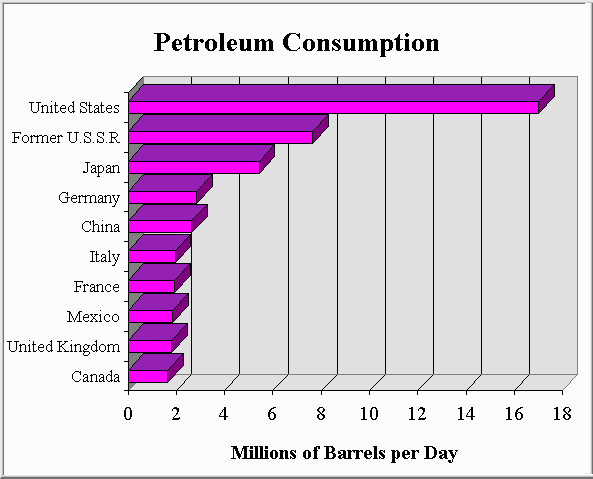| Oil: Energy or Petrochemicals |
Oil: Energy or Petrochemicals
Power for an Energy Hungry Nation
At the birth of our Nation (1776) energy was used primarily to heat
houses and cook food; requiring only timber and coal. Water
power was sufficient for the textile factories and grain mills
that existed, while animal power helped till the fields and
provide transportation. However, as the Industrial Revolution
(18th Century to today) rolled along, larger quantities of mechanical energy
were soon required. Several inventions helped meet these needs, but in the
process they also consumed vast quantities of fossil fuels.
Steam Engines: Developed by the likes of Savery, Newcomen, and
Watt; steam engines burned coal to supply energy for locomotives,
paddleboats, and factories.
Gasoline Engines: With the invention of the internal
combustion engine, and the advent of gasoline automobiles in 1885 by
Karl Benz, petroleum soon became a sought after energy source.
Electricity: With the perfection of the electric light in
1879, Thomas Edison had enlightened the world. However, he had also invented a
new energy consuming device. Because of the failings of nuclear power to gain
widespread acceptance, electricity generation continues to consume vast
amounts of coal.
The modern American household is packed full of energy consuming
devices all designed to make life a little easier. Central heating,
air conditioners, fans, electric lights, ovens, microwave ovens, hot water
heaters, washing machines, dryers, dish washers, refrigerators, freezers,
television sets, computers, and who can forget the automobile; when used
cumulatively consume huge amounts of energy. Despite having only about 5% of
the worlds population, because of these modern convienences we claim a
30% share of the world's annual energy consumption. The non-renewable fuels
used to supply this energy hungry lifestyle are shown below.


Petroleum: For Fuel or Plastic?
Petroleum is so important to our society that it has rightfully
earned the title "black gold." When used to supply energy, petroleum is
converted into; gasoline, fuel oils, lubricants,
kerosene, and jet fuels. However, it is also necessary for;
plastics, waxes, asphalt, and all nature of fine organic
chemicals. Because of its value as a raw material, some claim that
petroleum is too valuable to burn! About half of all American
chemical engineers are employed by the petroleum industry; and
a huge industry it is (see below). The petroleum industry is one of the main
reasons chemical engineers have enjoyed such success.


|